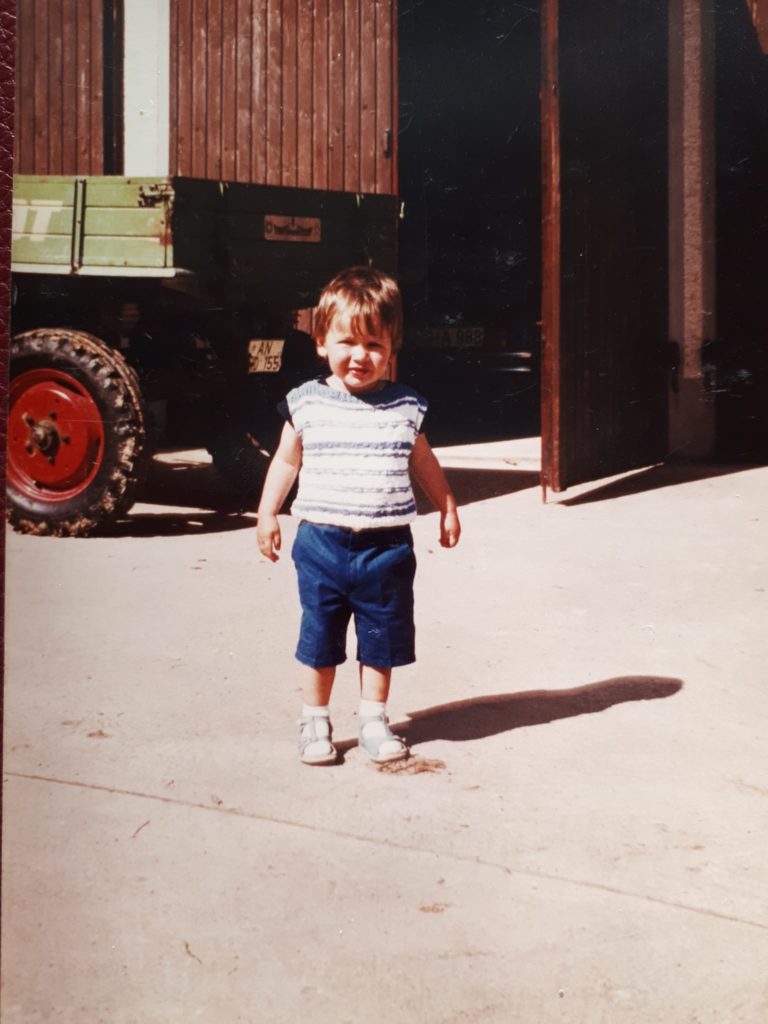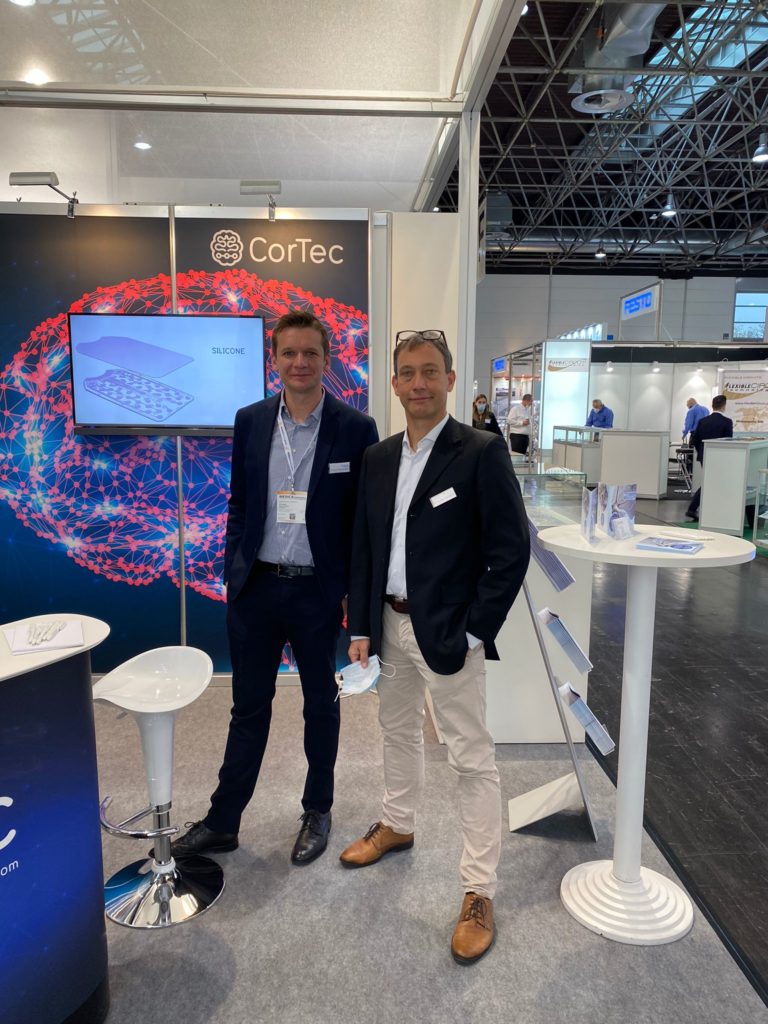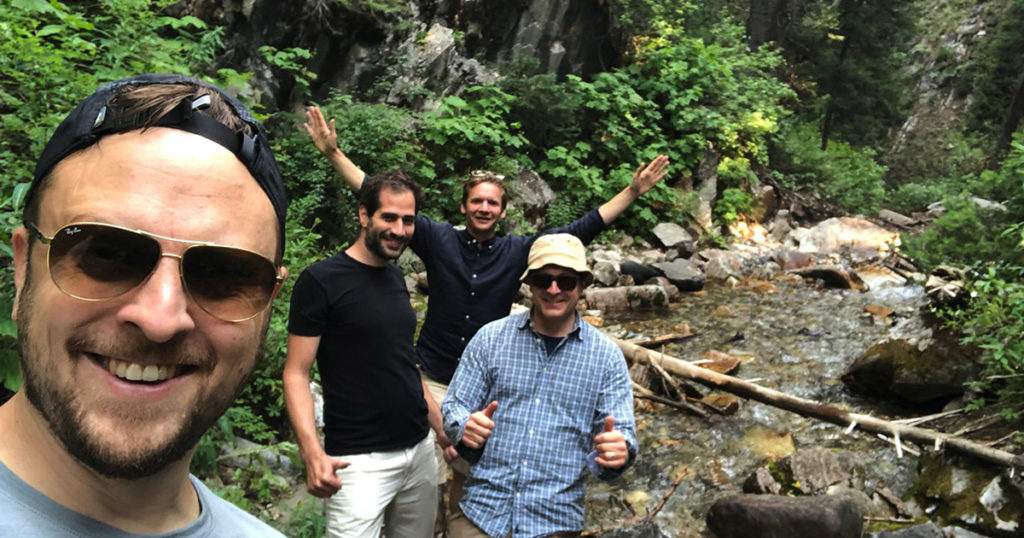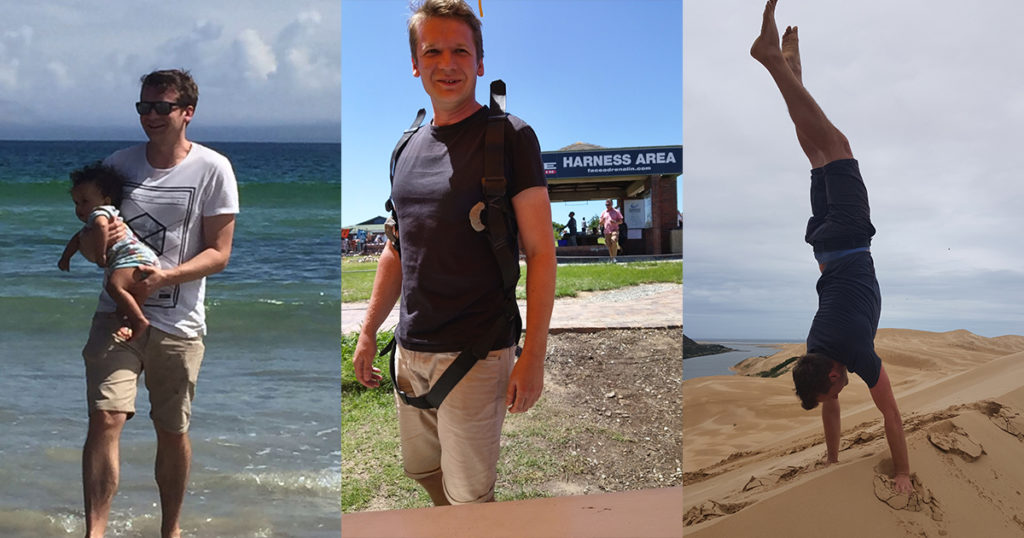My MedTech Life: CorTec’s Patrick Daubinger
Welcome to our blog series sharing highlights from conversations with Chamfr sellers, the leaders of companies that are helping to shape and drive the medical device industry forward.

This month, we spoke via videoconference with Patrick Daubinger, Sales & Marketing Director at CorTec. Based in Freiburg, Germany, CorTec develops and markets components, interfaces, and active implant systems to enable communication with the brain or other parts of the nervous system.
Learn how a Bavarian country boy grew up to be a leader on the cutting edge of the emerging field of bioelectronics and active implantables, how he made the transition from research to technical sales, and what it was like to start a new job on the first day of the pandemic lockdown.

As a kid, what did you want to be when you grew up?
I grew up on a farm in a little Bavarian village. When I was 3, my family moved to Kiel, on the Baltic Sea coast, where my father was working on his Ph.D. in engineering. It was a different world for me, coming from a small village to live in a city. My father was my role model, so it was clear to me at an early age that I wanted to go into science as well. Later on in school, I focused on chemistry and physics, so science is something I was always interested in.
How did you decide what to study at university?
I was looking for an innovative study program, something application oriented. I knew I didn’t want to do basic research like statistics or math. A friend of mine was studying microsystems engineering, and he described it as a very broad and interdisciplinary field covering physics and chemistry—things I was interested in—but with an applications focus. Microsystems and nanotechnology were new fields at the time, bringing advances in medical device technologies and in areas like fuel cells and sensors. That’s how I ended up in microsystems engineering.
Were you always interested in medical device applications?
My master’s degree program specialized in the biomedical field and nanotechnology. I worked with platinum-based electrodes for biomedical applications in my job as a research scientist, so that’s how I first heard of Johnson Matthey. I was quite fascinated by the company. I applied for a job, got invited to the US, and got the job offer. It gave me the opportunity to experience a broader picture; to see the world.
You went from being a Research Scientist at IMTEK (Department of Microsystems Engineering) at University of Freiburg to a technical sales position at Johnson Matthey. What was that transition like?
I had to learn to think and communicate differently in a technical sales role compared with a research scientist role. It was difficult in the beginning. I needed to explore different ways of explaining and presenting things to my teammates who were sales managers rather than scientists. Fortunately, I had a great boss and a great team, and they were very helpful. Even though the team was spread all over the world, they had great team spirit, and that really eased the transition. I didn’t have the same issue with customers because my research background facilitated communication with engineers and R&D managers.
I started as a product specialist for platinum electrodes, marker bands, nitinol tubing, and nitinol sheets, serving as a link between sales, management, and engineering. I gradually took over more responsibilities on the sales side and advanced to technical account manager.

What do you enjoy most about working in the medical device industry?
Most importantly, working in the medical device industry makes a real impact on people’s lives and improves their situation. That’s really motivating. Also, the medical device industry is a global business. I enjoy working internationally and meeting people all over the world. The industry is still small enough, though, that you meet people again and again. In August, I was in California for the MD&M show, and it was great to see old colleagues, customers, and friends.
The German medical device industry is the largest in Europe and the third largest in the world. What factors do you think contribute to Germany’s success in the industry?
There’s a long history of medical device companies in the region, like Biotronik, Carl Zeiss, and Fresenius. One reason is the university centers that specialize in biomedical or medical engineering. Another reason is German engineering with a focus on precision and quality.
What made you decide to take your current position at CorTec?
I was interested in the opportunity to build and grow a sales team at CorTec, bringing my experiences from a larger company. And from the technological side, the neuromodulation field is really growing. There are a lot of new things happening and new companies entering the business, so it’s really dynamic. That was appealing to me.
I started at CorTec the first day of the COVID-19 lockdown last year. My responsibility is building the sales side of CorTec working with medical device companies. It was tough in the beginning with video meetings only, never being able to meet in person. The team really helped me to get into the job and made it easier.
What was it like to go from working at a large multinational corporation to a much smaller, younger company?
CorTec was founded in 2010 and has about 70 employees today. In a small company, it’s a different way of working. There’s a lot of business development involved in this role. We work with many innovative new companies, new technologies. If you work for a big corporation, there are a lot of processes already in place. You don’t even need to think about them because they’ve been established for the last 20 or 30 years. In a young company, all these processes need to be established. The company itself is much more dynamic and the tasks are more diverse. You need to be self-motivated. Not only in a management role, but across the company. Of course, you can also make a bigger impact at a smaller company.
What is the CorTec corporate culture like?
There’s a real drive and enthusiasm for innovation—creating new solutions and technologies to help our customers develop the best possible products. It’s a culture of collaboration with customers and with teams. Communication between departments is fluid and productive.
CorTec is a young company with a dedicated workforce. We have young people coming in from universities, but also have more experienced people. You need both: You need young people to be innovative, and you need experienced people to guide them.
It’s a fun and inspiring place to work with a high level of engagement. We do activities together apart from work, like going out to dinner or doing sports activities. For example, we have a team participating in the Freiburg Marathon next April. We also have teambuilding events and go climbing or hiking together. It helps to build team spirit.

What is the coolest product or therapy that CorTec technology has been a part of?
We helped make it possible for paralyzed people to grab a glass and to use their arms and hands again by bypassing the nerves. We provided the customer with cuff electrodes and they implanted them into patients who were paralyzed from neck down. You connect the electrodes at the muscles somewhere around the neck, which allows you to bypass the nerves in the arm.
What are the top 3 things you’d want a design engineer to know about CorTec or its products or capabilities?
The #1 thing is that we are on Chamfr! You can just go there and order one of our standard products to start your research. But what’s really cool about all our products is that they’re highly customizable. This is especially important in the research or early product development phase. So #2 is customization. I would say #3 is that we’re really easy to work with. We have a broad team of engineering experts who work closely with our customers to provide innovative technology to help advance and accelerate new products and enable new therapies.
What appealed to you about partnering with Chamfr? Why was it a good fit for CorTec?
What I really like is that engineers can easily access and order products. It’s like Amazon. There’s no other place in the med device industry where you can simply go to a website and find all your medical components in one place. I believe this is the future. People want to order as simply as possible, and Chamfr is the perfect platform for that.
In our case, we often have very complex products, so we use Chamfr as a marketing tool. Customers can start their research with a standard electrode, test it out, and come back for a more customized product. It’s the perfect platform for standard products and early prototypes.
The products we have on Chamfr are currently limited to cuff electrodes and small grid electrodes, but we definitely want to grow that and make our offering broader, including percutaneous and larger grid electrodes.
What can CorTec do that no one else can?
We work closely with our customers to help them customize products very easily. We use all medical-grade materials that are well known for implant products. However, we apply a different process to make smaller electrodes with higher channel counts, which enables the customer to make more precise and effective devices with better outcomes for the patient.
In the next 3-5 years, what do you see as the biggest growth opportunities for neurotherapy and bioelectronic medicine? How do you see CorTec supporting that growth?
Bioelectronic medicine is a growing field, especially the peripheral area, where you can influence all organs in the body. There’s a huge variety of treatment options. There’s currently only one company in the bioelectronic medicine field that’s successful, but it’s only for one or two indications. Several companies—including the big medical device companies—are looking at getting into the space.
CorTec will also play an increasing role in the field of brain-computer interfaces in the coming years. We are collaborating with other companies, start-ups, and university hospitals to improve their products by providing a closed-loop implant therapy platform for direct use in preclinical and clinical settings. We are convinced that this will accelerate new developments in neuromodulation and the emerging field of bioelectronic medicine.
What’s a key lesson you’ve learned during your career?
I like learning new things. What’s really important—especially when you’re starting your career—is having a good mentor you can learn from. Someone who helps and supports you, and gives you time to learn and grow into new positions. That was really important for me when I started in the medical device industry.
What are your hobbies? Do they provide any lessons for your professional life?
I like sports like running and swimming in the summer. Here in southwest Germany, we’re close to the Alps, so I go skiing in the winter. I think if you have an office job and travel a lot, it’s really important to have some kind of balance. Sports gives me that balance—the grit to go further and the determination to keep learning, improving, and growing—in both my personal and professional life.

Let’s keep in touch.
Don’t miss seller news, product alerts, and insights. Sign up for our emails to receive updates directly in your inbox.